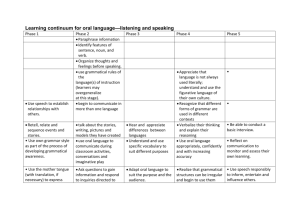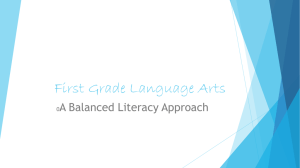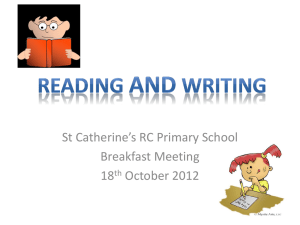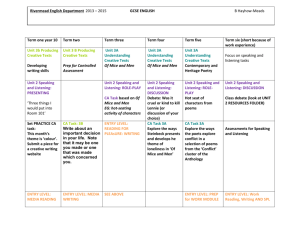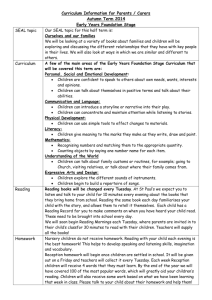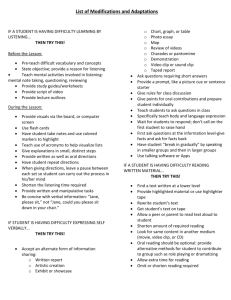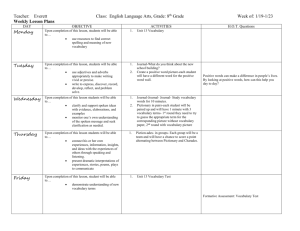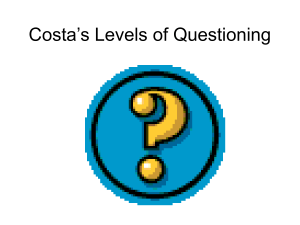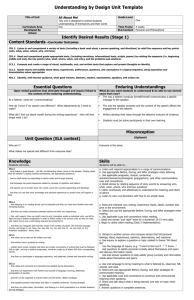whole school reading child speak targets
advertisement
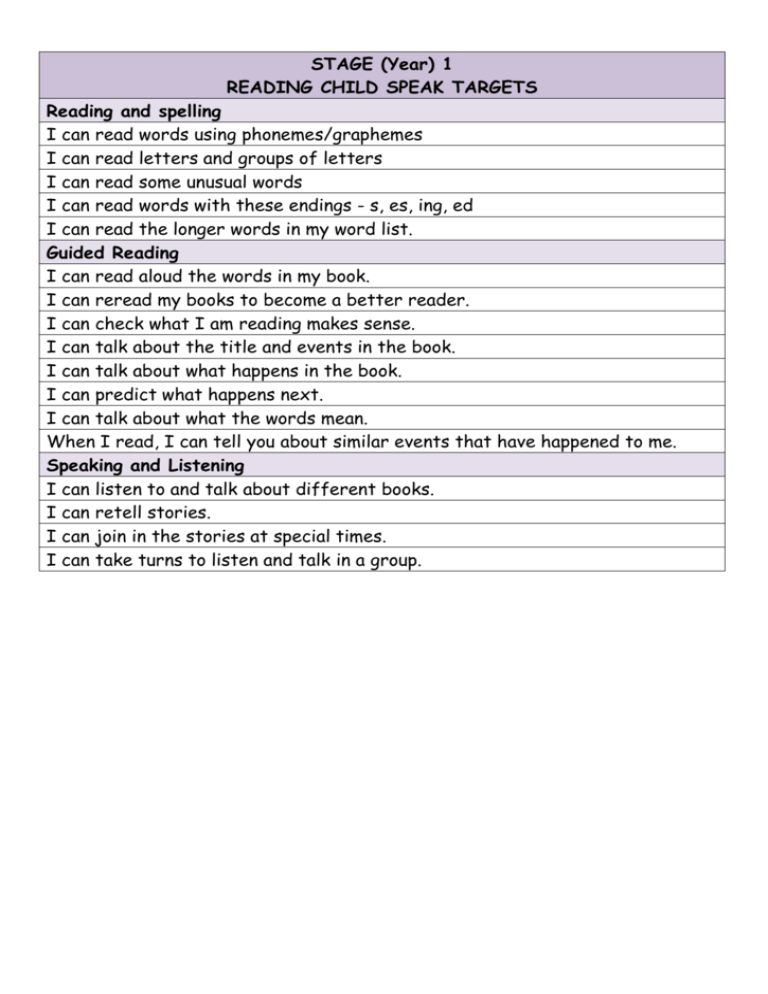
STAGE (Year) 1 READING CHILD SPEAK TARGETS Reading and spelling I can read words using phonemes/graphemes I can read letters and groups of letters I can read some unusual words I can read words with these endings - s, es, ing, ed I can read the longer words in my word list. Guided Reading I can read aloud the words in my book. I can reread my books to become a better reader. I can check what I am reading makes sense. I can talk about the title and events in the book. I can talk about what happens in the book. I can predict what happens next. I can talk about what the words mean. When I read, I can tell you about similar events that have happened to me. Speaking and Listening I can listen to and talk about different books. I can retell stories. I can join in the stories at special times. I can take turns to listen and talk in a group. STAGE (Year) 2 READING CHILD SPEAK TARGETS Reading and spelling I can read words quickly by sounding out. I can read by blending sounds together. I can read words with 2 or 3 syllables. I can read words with endings like -ing and -ed. I can read unusual words from the word list Guided Reading I can answer and ask question about what I have read. I like to predict what happens next in the story. I can tell why certain things happen in a book. I can discuss the meaning of words. I can tell you my favourite words and phrases from my reading. Speaking and Listening I can listen and talk about poems and stories I have read. I can tell you about the stories I have read. I enjoy finding out things in non-fiction books. I can recognise word patterns in stories and poems. I can say some poems I have learnt. STAGE (Year) 3 READING CHILD SPEAK TARGETS Reading and spelling I can read most words quickly and accurately. I can often check what I am reading makes sense by talking about it. I can use my knowledge of most words to help me read and understand the meaning of new words. I know that some words sound different to how they are spelt. Guided Reading I I I I I I am beginning to am beginning to am beginning to am beginning to am beginning to am beginning to use non‐fiction books to find out about things. retell some fairy tales and traditional stories. predict events in stories from what I have read. use evidence from different parts of the text to support my ideas. justify my ideas with evidence from the book. discuss words and phrases that interest me. I am beginning to identify different themes in a wide range of books. I am beginning to tell what the main ideas of the book are from reading a few paragraphs. Speaking and Listening I can often show you I have understood an increasing wide range of texts I have read. I can often use a dictionary to check the meaning of new words. I am beginning to retell some fairy tales and traditional stories. I am beginning to retell and perform poems and play scripts to read aloud. I am beginning to recognise different types of poetry. STAGE (Year) 4 READING CHILD SPEAK TARGETS Reading and spelling I I I I can read most words quickly and accurately. can check what I am reading makes sense by talking about it. can use my knowledge of words to help me read and understand the meaning of new words. know that words sound different to how they are spelt. Guided Reading I I I I I I can use non‐fiction books to find out about things. can retell some fairy tales and traditional stories. can predict events in stories from what I have read. can use evidence from different parts of the text to support my ideas. can justify my ideas with evidence from the book. can discuss words and phrases that interest me. I can identify different themes in a wide range of books. I can tell what the main ideas of the book are from reading a few paragraphs. Speaking and Listening I can show you I have understood an increasing wide range of texts I have read. I can use a dictionary to check the meaning of new words. I can retell some fairy tales and traditional stories. I can retell and perform poems and play scripts to read aloud. STAGE (Year) 5 READING CHILD SPEAK TARGETS Reading and spelling I am beginning to use the words and word parts that I can read and understand already to think about what new words mean and sound like. Guided Reading I am beginning to present or debate on topics I have read about, using notes if needed. I am often able to justify my views. I can often retrieve, record and present information from non‐fiction. I can ask questions about what I have read to further improve my understanding. From my reading, I can often predict what may happen in a story from details given and suggested in the text. I am beginning to identify key details and ideas in texts by summarising a given number of paragraphs I have read. I can often show my understanding of what I have read by drawing inferences from within the text and justifying them with evidence. I can often distinguish between statements of fact and opinion. I can often show how language, structure and presentation all contribute to meaning in texts I read. I can often check my understanding of books I have read through discussion and exploring the meaning of words. Speaking and Listening I am beginning to know how authors use particular language which will have impact on me, the reader. I can often participate in discussions about books I have read, or those that have been read to me by listening to others' ideas and at times challenging views courteously if they differ from my own. I am becoming familiar with a wide range of books from our own literary heritage and also books from other cultures and traditions. I am beginning to recommend books I have read to my friends. I am gaining confidence to read aloud and perform poems and plays, and use appropriate intonation, tone and volume to help the audience with their own understanding. STAGE (Year) 6 READING CHILD SPEAK TARGETS Reading and spelling I can use the words and word parts that I can read and understand already to think about what new words mean and sound like. Guided Reading I can present or debate on topics I have read about, using notes if needed. I am able to justify my views. I can retrieve, record and present information from non‐fiction. I can ask questions about what I have read to further improve my understanding. From my reading, I can predict what may happen in a story from details given and suggested in the text. I am able to identify key details and ideas in texts by summarising a given number of paragraphs I have read. I can show my understanding of what I have read by drawing inferences from within the text and justifying them with evidence. I can distinguish between statements of fact and opinion. I can show how language, structure and presentation all contribute to meaning in texts I read. I can check my understanding of books I have read through discussion and exploring the meaning of words. Speaking and Listening I know authors use particular language which will have impact on me, the reader. I can participate in discussions about books I have read, or those that have been read to me by listening to others' ideas and at times challenging views courteously if they differ from my own. I am becoming familiar with a wide range of books from our own literary heritage and also books from other cultures and traditions. I like to recommend books I have read to my friends. I am able to read aloud and perform poems and plays, and use appropriate intonation, tone and volume to help the audience with their own understanding.

